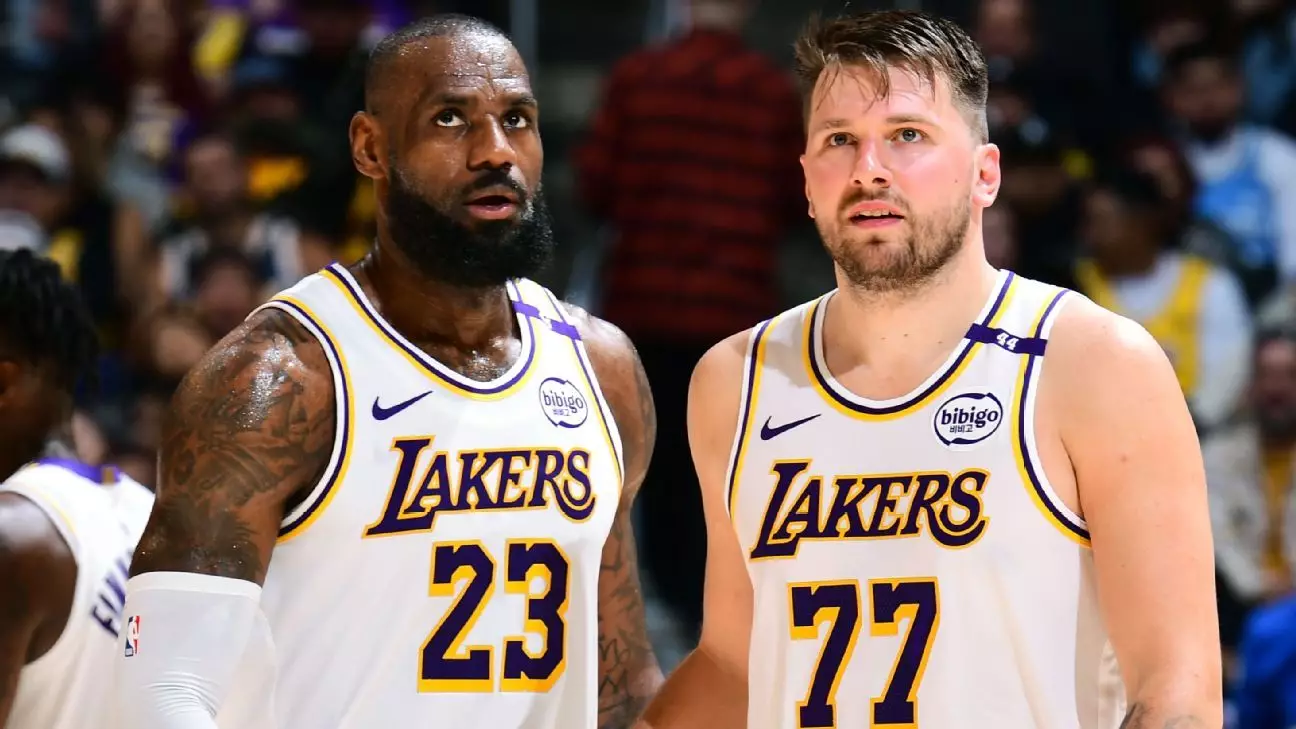In the high-stakes universe of the NBA, where contracts are as fleeting as the players’ primes, the recent extension of Luka Doncic with the Los Angeles Lakers is more than just a financial move—it’s a statement about legacy, influence, and the transfer of leadership. While the formalities of a three-year, $165 million deal seem straightforward, the undercurrents reveal a deeper narrative. LeBron James, a veteran whose shadow looms large over the league, reaching out to congratulate Doncic signifies more than camaraderie; it embodies the mentorship role that veteran stars often undertake in shaping the futures of rising talents. James’s personal recognition underscores the mutual respect between these two generational icons, highlighting how mentorship in sports often transcends direct team affiliation and becomes a catalyst for legacy-building.
James’s public component—his heartfelt wish for Doncic to remain with the Lakers—serves as a subtle narrative of loyalty and influence. It demonstrates the indispensable role that seasoned veterans play in both team culture and player development. When James openly praises Doncic and expresses his admiration, he’s not merely engaging in fanfare; he’s reinforcing a mentorship dynamic, subtly guiding the younger star with his experience. This interaction encapsulates a broader truth within professional sports: that leadership is as much about influence and example as it is about individual accolades. In a league obsessed with titles and stats, the mentorship and camaraderie backstage often shape the future trajectory of titles and team success more profoundly than signing contracts.
The Delicate Balance of Power and the Future of the Lakers’ Dynasty
While Doncic’s extension signals continuity for the Lakers’ NBA ambitions, the situation surrounding LeBron James complicates the narrative. At age 40, James’s future in the league remains a constant question mark—a puzzle that his camp, led by powerful figures like Rich Paul, navigates with calculated uncertainty. The statement regarding James’s desire to “compete for a championship” and his acknowledgment of the Lakers’ rebuilding efforts reveals a nuanced stance that embraces both loyalty and ambition. James’s decision to opt into his final year states a readiness to remain at the Lakers, yet it simultaneously leaves the door ajar for future transitions.
James’s influence within the organization underscores a truth that often gets lost in the limelight: that veteran leadership sometimes hinges on the quiet power of influence rather than public proclamations. His desire to finish his career where he has spent the last eight years—potentially retiring a Laker—reflects an understanding of legacy, not just in titles but in association and cultural impact. It’s a subtle reminder that NBA stars are as much custodians of their franchises’ histories as they are athletes chasing their next badge of glory.
The Lakers’ management, led by Rob Pelinka, attempts a delicate dance—balancing respect for James’s contributions with a strategic plan for future competitiveness. Pelinka’s comments suggest an internal consensus that respects James’s autonomy while recognizing his importance to the organization’s identity. This mutual respect signals that, although the future is uncertain, the current relationship between veteran and franchise remains resilient and adaptive in a sport that’s continuously evolving.
Leadership in Transition: The Future of Legends and the League’s Evolution
The NBA’s landscape is witnessing a generational shift, with veterans like James serving as bridges rather than just relics of a bygone era. Their mentorship of rising stars such as Doncic reflects a broader cultural trend—leadership in sports is increasingly about laying the groundwork for the next wave of greatness. Doncic’s contract signifies his arrival not just as a franchise cornerstone but as a player expected to carry the league’s torch forward. His recognition by James hints at a transfer of responsibility—one where greatness is no longer solely about individual stats but about carrying the mantle of leadership, culture, and mentorship.
The league’s future hinges on this delicate interplay between old and new—between established legends and emerging stars. James’s influence extends beyond the court, impacting locker room dynamics, fan perceptions, and the strategic decisions of the Lakers. Meanwhile, Doncic’s rise underscores the league’s shifting power structure, where international talents and younger phenoms challenge the traditional NBA hierarchy.
However, this evolution also exposes the inherent volatility of player loyalty and franchise stability. James’s future remains a question mark, and his decision will undoubtedly influence the Lakers’ long-term planning. His statement about wanting to “make every season count” encapsulates the modern athlete’s dilemma—balancing the desire for legacy, personal achievement, and team success while navigating a league that seems to prioritize short-term results over long-term stability.
In an era where contracts are multi-million dollar statements and player power is at an all-time high, the true essence of leadership lies in influence, mentorship, and vision. The scene of James congratulating Doncic just after signing a massive deal exemplifies how sport functions as a complex web of relationships—where loyalty, ambition, and legacy intertwine. As the NBA continues to evolve, these stories remind us that the game’s true power resides not solely in the points scored but in the subtle, often unseen, forces that shape its future.


Leave a Reply